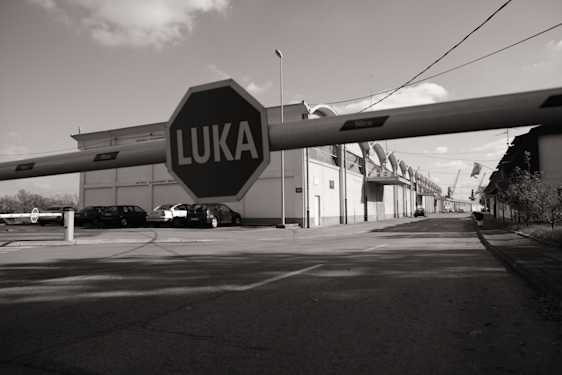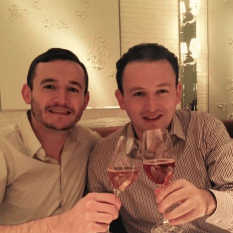
Luka - the soldier who’d hesitated was executed
Hodophiles is pleased to present an extract from the chapter 'Old Fairground' of Ian Bancroft’s new novel, Luka, which tells of lives scarred by wars past and present, whose main characters - L., U., K., and A. - are confronted with the dilemmas of truth and justice, and the struggle to reconcile and forgive. It is inspired by Bosnia and Herzegovina and the wars in the former Yugoslavia.
A.’s great-grandfather remained by his love’s side, save when hauled off for gruelling daily labours. They held each other in different positions throughout the night, their bodies moulding themselves to one another and the confined space. It was intimacy amidst aversion, oblivious to the shifting mass of physiques intermingled with theirs. They cocooned each other, escaping the camp and its oppression for each fleeting hour of sleep, of which there were too few.
*****************************
A.’s great-grandfather and his one true love, inseparable as they were, volunteered to carry bodies from the van’s trunk to the river, the former taking the still-warm figure under his shoulders whilst the latter struggled to grasp the legs in unison. They would enter first and try to identify the lightest-looking frame amidst the mangled heap of what appeared to be peaceful sleepers, rummaging under one to find the flimsiest of victims. Both yelped in their lyrical ways as the initial thrust from the knees lifted the body out and onwards. It was only a short walk, partly up a minor embankment, but they relied upon the adrenaline of the moment and the occasional murmur from the corpse that frightened the life out of them. They would pause briefly for breath and a glimpse of freedom before following the guarded path, counting to three and disposing of the body like a sack of potatoes before instinctively wiping their hands together and on their trousers.
After six days, they knew their opportunities for escape were diminishing. His beloved hesitated while A.’s great-grandfather slipped swiftly and efficiently into the swollen river. Seized first by fright and then by the wrist, her feet never left the makeshift wooden pier with its broken planks. Through wayward strokes, he grappled to recover upstream. With a frantic, flailing motion, he grasped for a non-existent lifebelt whilst crying out her name in ever more desperate tones. Exhaustion quickly consumed him, and he lost consciousness. Washed up in a bed of debris, somewhere downstream past a ruined fortress which had once guarded a narrow part of the river’s course, he was fortunate that the waters had not drained him into the basin of those blackest of seas.
The soldier who could have shot first A.’s great-grandfather and then his beloved hesitated, pointing his rifle first at one, then the other, and back again. Whether out of shock at the audacity of escape or a loss of conviction borne by the futility of his act, it will forever remain unknown. Maybe it was an act of mercy or an implicit plea for forgiveness, for to save one life is to save all of humanity. Whatever he subsequently did in this war, a war that was not his, could be assuaged with the reminder that at least he did good in the few moments where such judgements were demanded. ‘They will have drowned anyway,’ he probably told his commander, missing the point entirely. It was not for inmates to choose when and how they would meet their end. To exercise such agency would be to remain human, to retain one’s capacity to decide. The soldier in question was declared a traitor and executed in the forehead by a colleague nominated by his superiors; his body was unceremoniously dumped into the river.
The neighbours of A’s great-grandfather raised their eyebrows, top-lips, and pickaxes in alarm when this dishevelled resemblance of a man unexpectedly returned home, gaunt from the loss of his beloved as much as from malnourishment and the many weeks, if not months (for no-one was sure of the duration of time anymore) walking across the desolate, crestfallen countryside. For several days he uttered not a single word; presumably, or so they thought, because of the horrors he had witnessed. They offered him cheese, bread, and brandy, but he only had an appetite for solitude.
When he finally spoke, it was to inquire about her whereabouts. Then, several days later, he wondered where he himself was. Without her presence, this had ceased to be his home. It was unrecognisable; a scattering of functional buildings and outhouses, with farmers and animals milling around in improvised existence. No matter how deeply he delved into the banks of his memory, there were no fragments to grasp onto.
The number with which he had been branded upon entry to the camp remained visible, though faded, on the inside of his right arm, a permanent reminder not of his imprisonment but of the very soul, his one true love, whom he had failed to accompany until death. In shame, he lived; a burden that remained impervious to the sentiments and persuasions of those who absolved him of any blame. No matter how well-intentioned their words, there was little comfort to be derived from those who told him it was not his fault, that there was nothing he could have done differently, and that their fate was sealed the moment they were apprehended and transported to that godforsaken place.
There were no records of her death, neither from the camp archives, incomplete as they were, nor anywhere else. There was no body to bury and no remains with which to be reunited. The tantalising prospect that she would one day return to the village, just as he had done so himself, only served to prolong his agony, to keep the flame of hope flickering in his heart despite the weight of despair that overshadowed his every waking moment.
A headstone was erected in her memory, adorned with one of the few remaining photographs, alongside an empty oval that awaited his portrait. It was left to those who chose to remember him, to honour his life and legacy, to decide which part of his life was most faithful to their enduring memories of him.
Some of her belongings, including meagre tokens of his love, were placed in a wooden box, and lowered into the ground, a ceremonial burial that brought closure to all but A.’s great-grandfather. Inscribed on the headstone were the words, ‘you will forever be my message in a bottle.’ Her voice would perdure, of that he was sure. At its base, he would leave a fresh bunch of flowers, always golden lilies, that he would replace before they withered and wilted.
Ian Bancroft is a writer based in the former Yugoslavia. ‘Luka’ can be purchased by clicking on the following link.
Ian is a writer based in the Balkans. He is the author of 'Dragon's Teeth - Tales from North Kosovo' and 'Luka'. Follow Ian on Twitter @bancroftian.
Currently in: Belgrade, Serbia — @bancroftian
